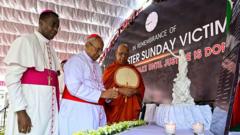The victims, who were attending Easter mass at their respective churches, have been immortalized for their steadfast devotion, despite the horrific acts of terrorism they faced. Initial investigations attributed the attacks to Muslim extremists, yet many families of victims and members of the Christian community have critiqued the government's lack of accountability and the slow pace of justice. They argue that crucial intelligence warnings were ignored, which could have prevented the catastrophe.
As the controversy unfolded, the Supreme Court held former president Maithripala Sirisena liable for compensation, citing his failure to act on actionable intelligence. In 2021, a trial commenced against 25 individuals implicated as masterminds of the bombings, but the extensive number of charges—totaling 23,000—has slowed the judicial process significantly, causing concerns that resolution may take years.
Cardinal Ranjith and the Catholic community have repeatedly accused the previous government of attempting to shield those behind the violence from scrutiny. A 2023 investigation by Channel 4 suggested potential collusion between the government, military, and the attackers, igniting further public outrage. In the aftermath of the attacks, Gotabaya Rajapaksa was elected president, running on promises of bolstering national security, and he dismissed the documentary's allegations in parliament.
With a new government in place following the 2024 elections, renewed investigations into the bombings are underway. A presidential inquiry commission has submitted a report to the central investigative agency for further action. Prime Minister Harini Amarasuriya emphasized the administration’s commitment to ensuring justice for victims, stressing that transparency and accountability are key to restoring public trust and honoring the legacy of those lost.
As the controversy unfolded, the Supreme Court held former president Maithripala Sirisena liable for compensation, citing his failure to act on actionable intelligence. In 2021, a trial commenced against 25 individuals implicated as masterminds of the bombings, but the extensive number of charges—totaling 23,000—has slowed the judicial process significantly, causing concerns that resolution may take years.
Cardinal Ranjith and the Catholic community have repeatedly accused the previous government of attempting to shield those behind the violence from scrutiny. A 2023 investigation by Channel 4 suggested potential collusion between the government, military, and the attackers, igniting further public outrage. In the aftermath of the attacks, Gotabaya Rajapaksa was elected president, running on promises of bolstering national security, and he dismissed the documentary's allegations in parliament.
With a new government in place following the 2024 elections, renewed investigations into the bombings are underway. A presidential inquiry commission has submitted a report to the central investigative agency for further action. Prime Minister Harini Amarasuriya emphasized the administration’s commitment to ensuring justice for victims, stressing that transparency and accountability are key to restoring public trust and honoring the legacy of those lost.

















